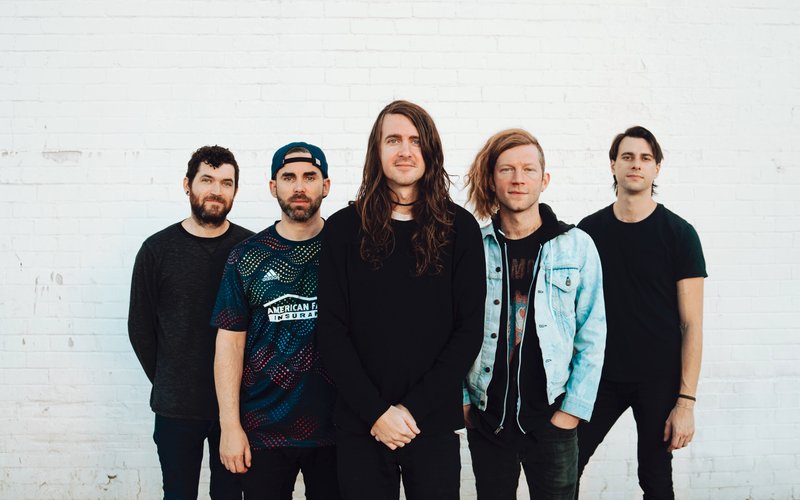Words: Miljan Milekić
Much like many others, I got into Mayday Parade back in 2007 when I first heard ‘A Lesson In Romantics.’ I fell in love with their debut, now widely considered a cult classic, and stuck around ever since. Last year’s ‘What It Means To Fall Apart’ was no different. With a carefully mixed cocktail of modern and nostalgic, the album was a staple on my playlist this past winter, while ‘Kids Of Summer’ goes down as one of my favorite songs of 2021. Therefore, I was happy to jump to the opportunity to have them for an interview. Tune in for a chat with bassist Jeremy Lenzo.

Hi guys! First of all, hope you’re all safe and good. So, your new record ‘What It Means To Fall Apart’ dropped back in November, giving you a bit of time to reflect on it. How do you like the feedback so far, and do you think it succeeded to translate the messages you wanted to send with it?
Jeremy: I think the feedback has been great. Everyone who has talked to me about the album has expressed a different favorite song, and I think that is awesome. We try and always blend a little bit of everything into our records, so to me, that’s a sign we’re doing a good job. I think the fans understood the different ideas we were trying to express, and it seemed to resonate with a lot of people.
The record saw you exploring different songs and sentiments, and writing songs as diverse as ‘Angels Die Too’ and ‘Kids Of Summer.’ And yet, it’s unmistakably a Mayday Parade album. How challenging was it to tie it all together and deliver a strong and cohesive record?
Jeremy: Honestly, we never focus too much on cohesion. We try to balance it to a degree by not having too many slow or fast songs, but ultimately, we just try and choose the best songs we have at the moment or a song that may be unique to what we normally do. Because we all write in the band and all have our own style and inspirations, it ends up making a very eclectic album, and personally, I think that makes for a better record than trying to stick within one sound or style.
READ MORE: Check our interview with Canadian pop punk/emo band Youth Fountain
In my last question, I mentioned those two songs on purpose, especially because of the story about accompanying music videos. How hard was it to switch from one mode to another, both in songwriting and all the other segments of the record?
Jeremy: I don’t think it’s too difficult to switch from one mode to another, especially since we all write, like I mentioned. It actually makes it easier for writing because you’re not focusing on trying to write a whole record, you’re focusing on trying to write maybe four or five awesome songs, and if we all come together with that many in our pockets, we have a lot to choose from and are in a good place when narrowing it down to just twelve for the record. It’s not too different in the studio. When we get down to recording, we have always done things by majority vote. So if the majority agrees, for instance, a song needs to be acoustic instead of full band, then that’s what we end up doing, and whoever voted against it understands that we’re all just trying to make the record the best it can be.
For this one, you once again teamed up with Zack Odom and Kenneth Mount. At this point, can you imagine yourselves recording music without them, and what makes them such an obvious choice for you?
Jeremy: We have worked with Zack and Ken off and on throughout our entire career, since we were nineteen years old. At this point, they know what we are looking for when we come in, what each of us individually is capable of, and what our strengths are. They always have done a great job at helping us present the best version of ourselves and our music. I imagine we will try different producers and engineers like we have in the past, but we will always come back to Zack and Ken just because of the connection we have there.
A while ago, you were part of Hopeless Records‘ ‘Songs That Saved My Life’ project. As a band, you’re no strangers to talking about depression, personal struggles, and mental health in general. How do you feel about the importance of projects like this, and how important is it for you to be involved in it?
Jeremy: I thought it was a great project, and we were happy that they asked us to be involved with it. We try to talk a little bit about this on stage and just let the audience know that we’ve been there too. I think there is a stigma that you should keep your problems to yourself, but everyone needs someone to talk to, and everyone has struggled at some point. I think it’s very important that we stay involved with these issues, especially since our music touches on these topics.
This year marks the fifteenth anniversary of ‘A Lesson in Romantics,’ a record that became a staple in this scene. How does it feel to know you released an album that was so big for so many people?
Jeremy: It’s very humbling to know that this record has meant a lot to so many people. It’s not anything any of us ever expected when we were writing it, but it means the world.
Do you ever feel the pressure of it and do you ever get the feeling that whatever you do, some fans will still want to hear the old songs, and expect ‘A Lesson in Romantics 2.0’ over and over again? How do you cope with it?
Jeremy: We have always tried to make the music we want to make, but I would be lying if I said the pressure wasn’t there to some extent during the early days. Now, being seven records deep and having spent 16 years in the band, we don’t really think so much about recreating what we’ve done in the past. We try and focus more on how to make what we do next feel special and different.
READ MORE: Check our interview with the English band Trash Boat
The last few years were hard for everyone, and bands and musicians were surely no exception, to say the least. However, it seems that you managed to turn it to your advantage. Not only that you released your new album, but also offered a live sessions EP, as well as the ‘Out Of Here’ EP. How challenging was it to be as productive as you were, or was it your way of coping with everything that was going on in the world around you?
Jeremy: I would guess it was our way of coping with what was going on around us. At the start of the pandemic, we were at a loss for what to do, and finding motivation was hard, but as enough time went by, we realized it gave us more time to work on various things, spend more time with our families than we ever had, and all that opened up new ideas for music. We found our motivation again and started working on music, and decided to put out an EP just so fans knew we were still here since we couldn’t tour. Then we just kept writing and getting together to record until we had another whole record.
One more from me, and I think I know the answer, but how does it feel to be on the stage again, and bring new songs to your fans?
Jeremy: It feels really good! There is nothing like playing music to a room full of people who are singing your words back to you. We have really missed playing live music, so we are thankful to be back out here doing it.
Follow Mayday Parade:
Website: maydayparade.com
Facebook: facebook.com/maydayparade
Instagram: instagram.com/maydayparade
Twitter: twitter.com/maydayparade


